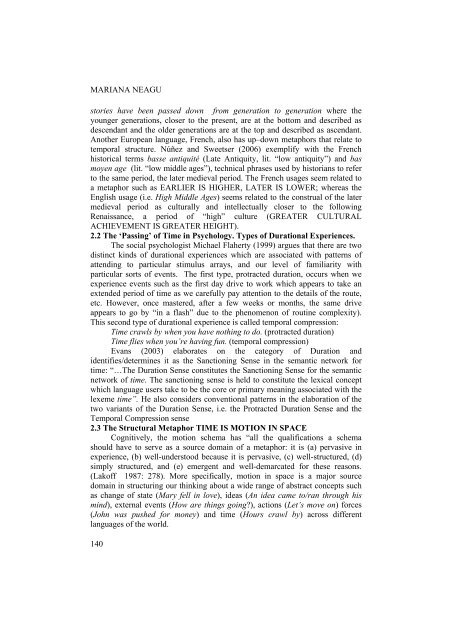culture, subculture and counterculture - Facultatea de Litere
culture, subculture and counterculture - Facultatea de Litere
culture, subculture and counterculture - Facultatea de Litere
You also want an ePaper? Increase the reach of your titles
YUMPU automatically turns print PDFs into web optimized ePapers that Google loves.
MARIANA NEAGU<br />
stories have been passed down from generation to generation where the<br />
younger generations, closer to the present, are at the bottom <strong>and</strong> <strong>de</strong>scribed as<br />
<strong>de</strong>scendant <strong>and</strong> the ol<strong>de</strong>r generations are at the top <strong>and</strong> <strong>de</strong>scribed as ascendant.<br />
Another European language, French, also has up–down metaphors that relate to<br />
temporal structure. Núñez <strong>and</strong> Sweetser (2006) exemplify with the French<br />
historical terms basse antiquité (Late Antiquity, lit. “low antiquity”) <strong>and</strong> bas<br />
moyen age (lit. “low middle ages”), technical phrases used by historians to refer<br />
to the same period, the later medieval period. The French usages seem related to<br />
a metaphor such as EARLIER IS HIGHER, LATER IS LOWER; whereas the<br />
English usage (i.e. High Middle Ages) seems related to the construal of the later<br />
medieval period as culturally <strong>and</strong> intellectually closer to the following<br />
Renaissance, a period of “high” <strong>culture</strong> (GREATER CULTURAL<br />
ACHIEVEMENT IS GREATER HEIGHT).<br />
2.2 The ‘Passing’ of Time in Psychology. Types of Durational Experiences.<br />
The social psychologist Michael Flaherty (1999) argues that there are two<br />
distinct kinds of durational experiences which are associated with patterns of<br />
attending to particular stimulus arrays, <strong>and</strong> our level of familiarity with<br />
particular sorts of events. The first type, protracted duration, occurs when we<br />
experience events such as the first day drive to work which appears to take an<br />
exten<strong>de</strong>d period of time as we carefully pay attention to the <strong>de</strong>tails of the route,<br />
etc. However, once mastered, after a few weeks or months, the same drive<br />
appears to go by “in a flash” due to the phenomenon of routine complexity).<br />
This second type of durational experience is called temporal compression:<br />
Time crawls by when you have nothing to do. (protracted duration)<br />
Time flies when you’re having fun. (temporal compression)<br />
Evans (2003) elaborates on the category of Duration <strong>and</strong><br />
i<strong>de</strong>ntifies/<strong>de</strong>termines it as the Sanctioning Sense in the semantic network for<br />
time: “…The Duration Sense constitutes the Sanctioning Sense for the semantic<br />
network of time. The sanctioning sense is held to constitute the lexical concept<br />
which language users take to be the core or primary meaning associated with the<br />
lexeme time”. He also consi<strong>de</strong>rs conventional patterns in the elaboration of the<br />
two variants of the Duration Sense, i.e. the Protracted Duration Sense <strong>and</strong> the<br />
Temporal Compression sense<br />
2.3 The Structural Metaphor TIME IS MOTION IN SPACE<br />
Cognitively, the motion schema has “all the qualifications a schema<br />
should have to serve as a source domain of a metaphor: it is (a) pervasive in<br />
experience, (b) well-un<strong>de</strong>rstood because it is pervasive, (c) well-structured, (d)<br />
simply structured, <strong>and</strong> (e) emergent <strong>and</strong> well-<strong>de</strong>marcated for these reasons.<br />
(Lakoff 1987: 278). More specifically, motion in space is a major source<br />
domain in structuring our thinking about a wi<strong>de</strong> range of abstract concepts such<br />
as change of state (Mary fell in love), i<strong>de</strong>as (An i<strong>de</strong>a came to/ran through his<br />
mind), external events (How are things going?), actions (Let’s move on) forces<br />
(John was pushed for money) <strong>and</strong> time (Hours crawl by) across different<br />
languages of the world.<br />
140












